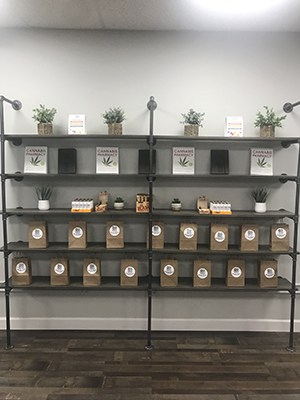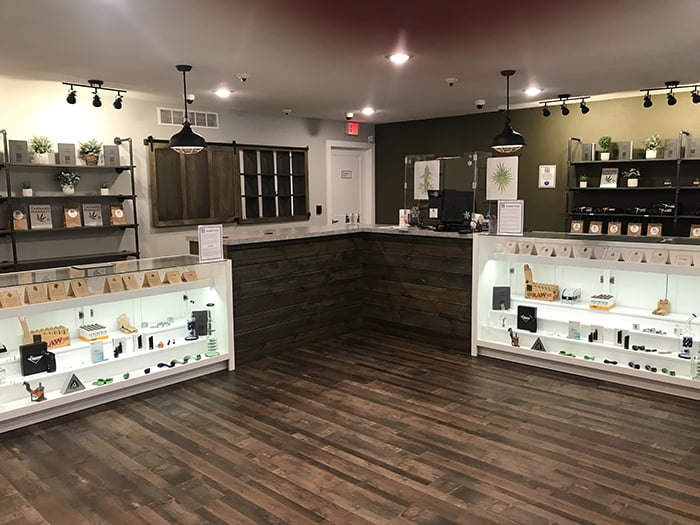
Despite operational hiccups stemming from the COVID-19 pandemic and supply chain shortages, Missouri Health & Wellness is working quickly to open five dispensary locations in the state’s medical cannabis market, which officially launched its first sales in October.
The company holds five retail licenses, which is the maximum number of licenses that any one company can have in Missouri’s market. Missouri Health & Wellness opened its first location in Washington at the end of November, and its second location in Sedalia just before Christmas. The company then opened a third dispensary in the state’s capital, Jefferson City, on Jan. 25. Now, Missouri Health & Wellness has its sights set on its final two stores in Kirksville and Belton, which will open by the end of the winter.

Photos courtesy of Missouri Health & Wellness
The company is standing up its locations quickly, despite Missouri’s medical program experiencing delays due to the COVID-19 pandemic. Missouri Health & Wellness HR Director and Regional Manager Kathleen Beebe says it took a year and a half for the state’s first dispensaries to open after the state began issuing patient ID cards, but there has been a steady increase in the number of patients enrolling in the program.
“What’s most exciting is when you have patients walking in the door for the first time and you hear about … what they’ve been dealing with, and they’re so excited to have another option,” Beebe tells Cannabis Business Times and Cannabis Dispensary.
Most of Missouri Health & Wellness’ patients are 60 years old and older, she says, and many are first-time cannabis consumers who are frustrated with the results of traditional medicine.
“I think that’s the No. 1 thing that excites me most about this industry, is that we are bringing some relief to people,” Beebe says.
The company also strives to create a diverse and inclusive culture, she adds, where employees feel valued and can make meaningful contributions to the company and the patients they serve.
Missouri Health & Wellness’ budtenders (called “wellness specialists”) go through a robust training program to ensure they can have educated conversations with patients about cannabis, Beebe says.
As with many new markets, Missouri’s medical cannabis industry is currently experiencing supply chain shortages, especially in the wake of the ongoing pandemic, which Beebe says has delayed the launch of many cultivators and manufacturers.
“They’re still under construction,” she says. “We’re starting to now see more and more of them entering the market, but we just had our first manufacturer pass their final inspection maybe a few weeks ago now. Obviously, it takes a little while for them to ramp up their production.”
The COVID-19 pandemic has also further restricted Missouri Health & Wellness’ ability to promote itself within the communities it serves, as in-person, patient-facing events have been on hold. Traditional marketing channels, such as social media, are also challenging for the industry due to the various platforms’ restrictions on cannabis.
“Social media doesn’t really like us to talk too much about cannabis, so it limits what we’re able to do,” Beebe says. “We’re really trying to get creative, using our website more and texting. We do have a text service, but … the carriers will block certain messages. … We’ve hired a new marketing agency to help us start thinking outside the box to look at those ways that we can get out there, despite COVID and the marketing challenges that the industry has probably always had to face.”
To keep its staff and patients safe during the ongoing pandemic, Missouri Health & Wellness checks the temperatures of everyone upon entering the store, and provides hand sanitizer to its employees and customers.
Patients are asked to complete paperwork upon entering the store for the first time, and the staff sanitizes the clipboards and pens after each use. The dispensary’s registers are also sanitized in between each customer, and staff and patients are asked to wear masks while inside the store.

Photos courtesy of Missouri Health & Wellness
Missouri Health & Wellness’ dispensaries sell flower packaged in eighths, as well as pre-rolls and edibles. The company started selling gummies and cannabis-infused beverages on New Year’s Eve, and Beebe says the dispensaries have seen an increase in business just by offering these two new product lines.
“We’re hearing that there are going to be some vape cartridges coming, and of course, there have been a lot of questions about concentrates,” she says. “I expect where we are today and where we’re going to be in two or three months is going to be dramatically different.”
Missouri issued 192 total dispensary licenses, and Beebe estimates that there are roughly 30 dispensaries currently open in the state.
“I expect that is also dramatically going to change in the next couple of months,” she says. “We’ll probably see the majority of them coming online, so what you see in this market today is going to look dramatically different in the next few months, between an increase in supply and an increase in the number of dispensaries that are open.”
Missouri Health & Wellness will continue to differentiate itself in the rapidly growing market through its friendly and supportive wellness specialists, Beebe says.
“I really stress to the team that it’s important to be respectful to each other,” she says. “Obviously, when that patient walks through the door, be mindful that they are dealing with something. They may be cranky because they’re not feeling well, and they need some help. That’s where we come in to support them, whether that’s sitting down and helping them figure out how to find their patient card online because it can be a little tricky to do that, or just having a conversation with them that you can relate [to]. … Customer service, to me, is going to be what really helps us stand out.”
Patient education is also a key differentiator for the company, Beebe adds. Many of Missouri Health & Wellness’ team members come from working in other states’ cannabis programs, which provides them with diverse cannabis knowledge to help support the company’s patients.
“We’re hearing a lot that we have a little bit of an uphill battle with breaking the stigma,” Beebe says. “It’s not like it’s unique to Missouri, but the fact that we’re a little bit more conservative state, we do know there are people who don’t support cannabis, so we’re helping to bring a professional tone to the industry. … You’re going to walk in and be treated like a patient, and your privacy is important. Having that professional customer service and taking care of the patient is ultimately where I see us focusing our attentions and breaking that stigma.”
